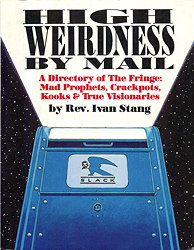Languages
A Horse with No Name in Latin
Posted By: Paul - Tue Oct 27, 2020 -
Comments (2)
Category: Animals, Humor, Parody, Languages, Music, 1970s
Unicorn Hunters
In 1976, a group at Lake Superior State University, calling itself the 'Unicorn Hunters,' released a "banished word list" that cataloged words they felt should be banished from the English language "for Misuse, Overuse and General Uselessness." Every year since then this group has released an updated new list. Words and phrases for 2020 include 'Quid pro quo,' 'Artisanal,' and 'Mouthfeel'.'Unicorn Hunters' is an odd name, and as far as I can tell, the origin of the name had nothing to do with the banished word list. It was invented by Wilmer T. Rabe, the public relations director at LSSU, who felt the school needed to let people know it was about more than just engineering. (It was best known, at the time, as a feeder school for Michigan Technical University). More info from the Des Moines Tribune (Aug 2, 1976):
"From there," says Rabe, "it kind of just grew and began to embrace more and more things."
Loosely put, unicornism — Lake Superior State style — is an abstraction seemingly devoted to the pursuit of joy.
Conglomerate stationery explains: "The Hunters are dedicated to the proposition that every man has a unicorn which he is predestined to hunt. It is not necessary that he actually find or slay this unicorn, merely that he diligently seek it."
To this day, you can still download a Unicorn Hunting License from the school's website. The Banished Word List was one of the ideas created by this group.
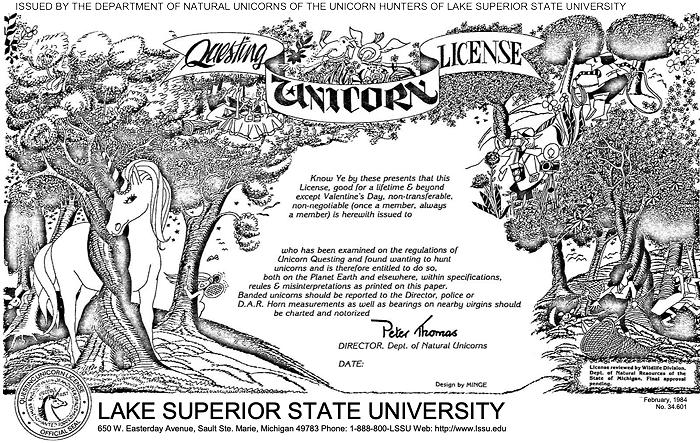
The irony is that, in recent years, the term 'Unicorn Hunters' has come to acquire a very different meaning. Googling the term now brings up this definition:
Maybe it's time for LSSU to add 'Unicorn Hunters' to its banished word list.
Posted By: Alex - Fri Oct 23, 2020 -
Comments (2)
Category: Languages, 1970s
Pronouncing the Scientific Names of Seashells of North America
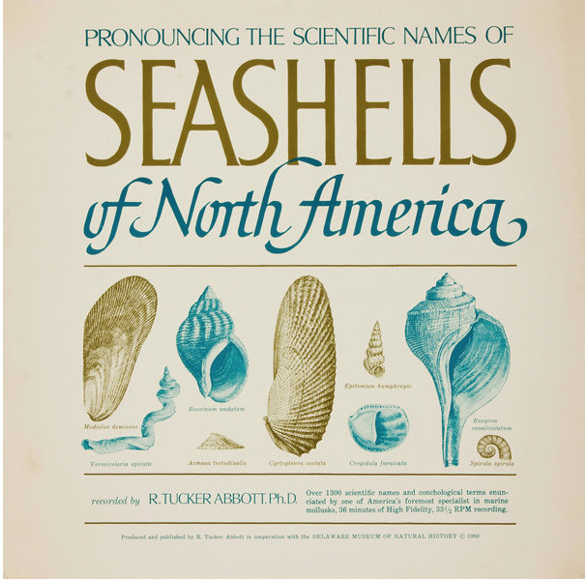
You can download the MP3 files here. Note: clicking the link does not initiate the download. You choose to do so at the new page.
R. Tucker Abbott begins with a statement sure to dissuade us from listening further. "Actually, there are no official correct pronunciations of these Latin names..."
Source.
Posted By: Paul - Tue Jul 28, 2020 -
Comments (2)
Category: Boredom, Languages, Nature, Oceans and Maritime Pursuits, 1960s
“Oh, it was my cruel parents who first did me trepan”
To trepan means to perforate the skull with a drill. Which makes the title of this old folk song from Norwich extremely odd.However, the song itself isn't actually about parents drilling a hole in the skull of their child, despite the title. Turns out, 'trepan' has another, archaic meaning, which is to trap or ensnare, and that's how it's used here.
But even though it isn't about pediatric brain surgery, it's still quite a dark and violent song.
It's performed below by Jon Wilks. He starts singing the song about halfway through the clip.
They married me to an old man for the sake of money and land.
If they'd married me to a young man without a penny at all,
He'd have took me in his arms and have loved me all the more.
Oh, it's, "Hush, my dearest Nancy, oh, wait 'til we go to town,
I'll buy you a lady's bonney, likewise a mus-e-lin gown;
There is no lady in the land your beauty can compare,
And I'll buy you a little lapdog to follow you everywhere."
"I want none of your little lapdogs nor none of your gentle care;
It's a pity that such an old man my beauty you should snare.
I am not sixteen years of age and scarcely in my bloom;
Oh, you are my cruel torment, both morning, night and noon."
When he comes to bed at night he's as cold as any clay:
His feet are as cold at midnight as corpse, I've heard them say;
His pipes are out of order and his old flute's never in tune:
Oh, I wish that he was dead and a young man in the room.
[Now some they do persuade me to drown him in a well,
And others do persuade me to grind him in a mill.
I'd rather take my own advice and tie him to a stake,]
Oh I'll get a big stick and labour him well, until his bones I break.
Source of lyrics
Posted By: Alex - Fri Jun 26, 2020 -
Comments (1)
Category: Languages, Music
Informative Swimwear
In 2005, Robert Dickey and Ruth Stephens filed a patent application for "swimwear as information device." Their idea was to make a line of swimwear that displayed maritime signal flags. This would allow people to communicate messages to those around them via their swimwear. They explained:The possible messages one could send seemed limitless, but they were never granted a patent. Perhaps the idea of messages on clothing was deemed too obvious.
There's also the limitation that only people conversant with maritime signal flags could decode the messages, which would make the various 'stay away' messages somewhat pointless.
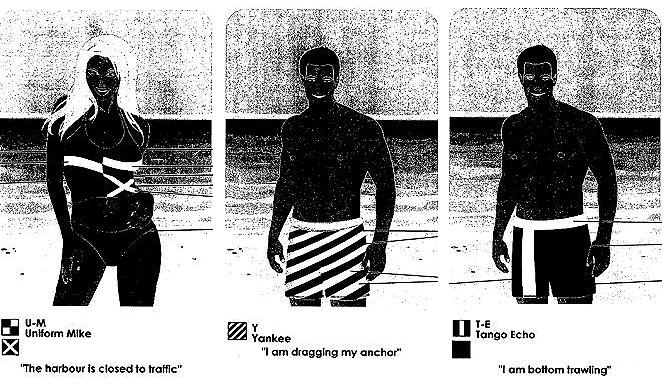
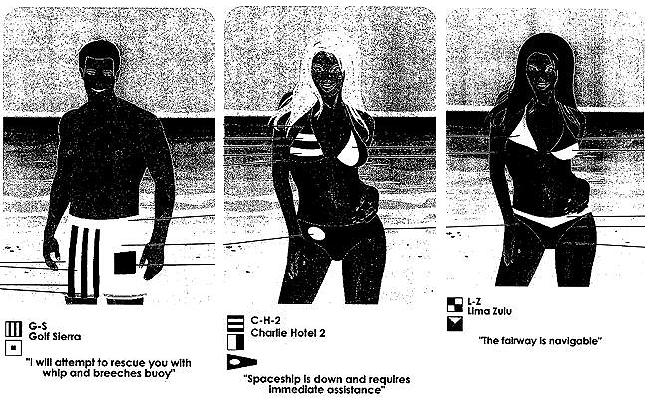

Posted By: Alex - Sun Apr 26, 2020 -
Comments (3)
Category: Boats, Fashion, Inventions, Patents, Languages, Double Entendres and Nudge-Nudge, Wink-Wink
Augmented Roman
Augmented Roman was one of the periodic attempts to improve and rationalize the English alphabet. Introduced in the 1960s by Sir James Pitman, the idea was to expand the alphabet from 26 letters to 43, and to have each letter represent a single, distinct sound. Unlike the current alphabet in which letters can have different sounds depending on context.Proponents of Augmented Roman imagined teaching children to read using this improved alphabet, and then having the kids switch over to the standard alphabet later. And that's where the plan ran aground, because most people figured that if kids have to learn the standard alphabet anyway, just teach them that from the beginning.
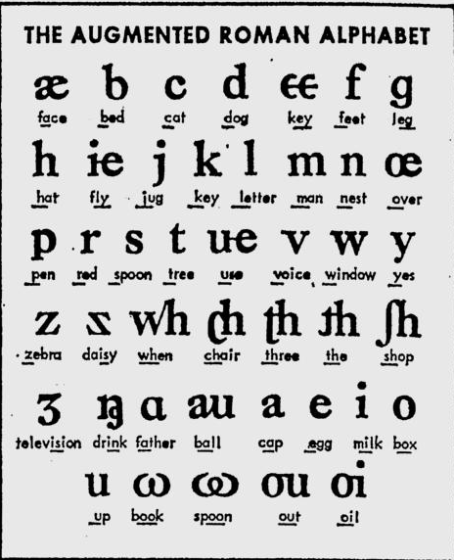
image source: omnivorenz

Tampa Bay Times - Sep 2, 1962
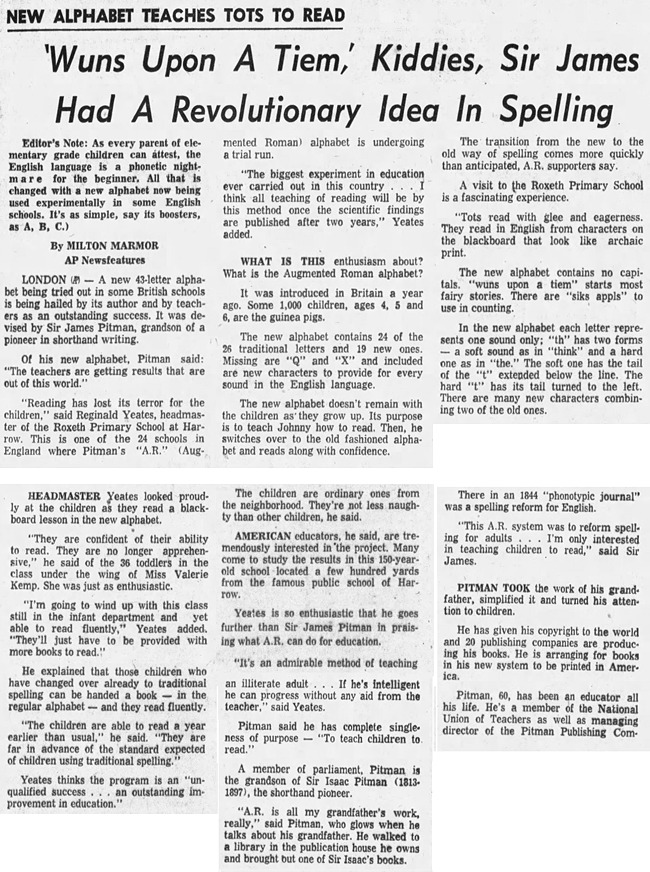
Tampa Bay Times - Sep 2, 1962
Posted By: Alex - Fri Oct 25, 2019 -
Comments (7)
Category: Education, Languages, 1960s
Flapper Dictionary
As defined by Wikipedia, "Flappers were a generation of young Western women in the 1920s who wore skirts, bobbed their hair, listened to jazz, and flaunted their disdain for what was then considered acceptable behavior. Flappers were seen as brash for wearing excessive makeup, drinking, smoking cigarettes, driving automobiles, treating sex in a casual manner, and otherwise flouting social and sexual norms."A "Flapper Dictionary" appeared in various newspapers and magazines in 1922. Selections below. Even more flapper terms can be found at Book Flaps and Click Americana.
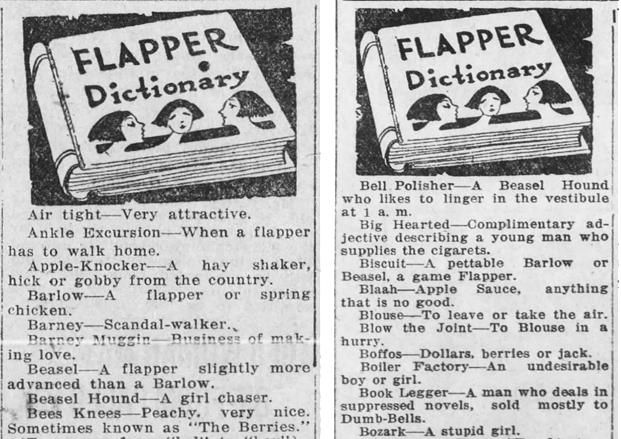
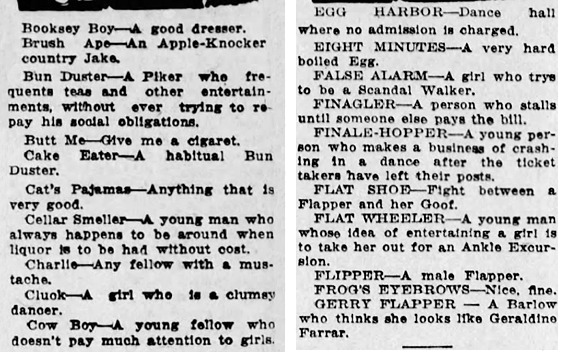
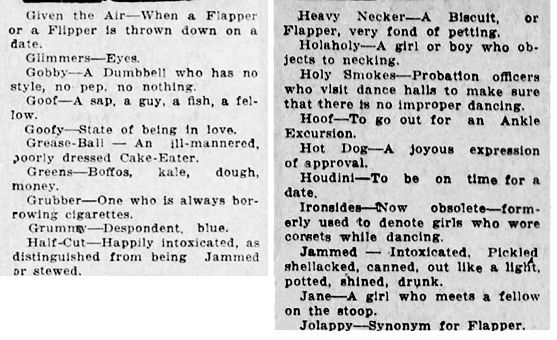
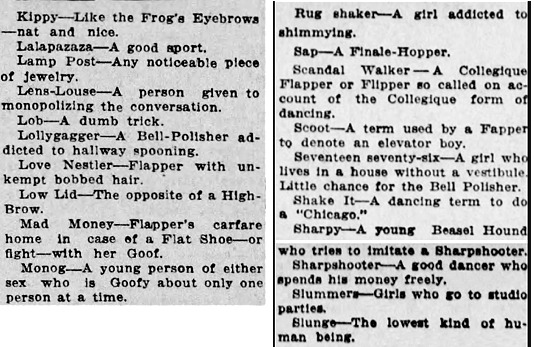
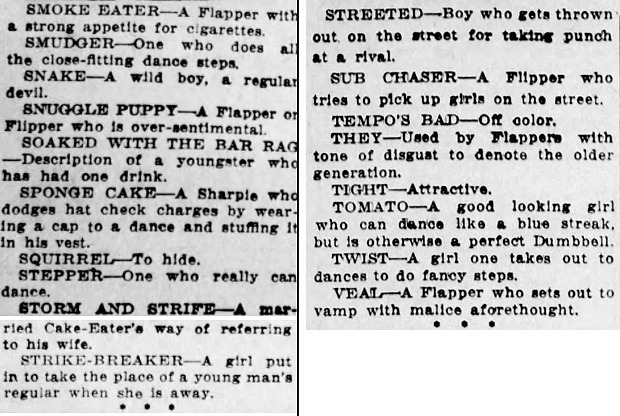
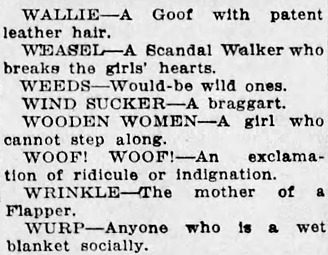
New Castle Herald - Apr 1922
Posted By: Alex - Tue Oct 08, 2019 -
Comments (4)
Category: Languages, Slang, Subcultures, 1920s
The Adequate Wiring Bureau
Nowadays, to describe something as 'adequate' sounds like it's damning with faint praise. It doesn't come across a ringing endorsement. It's like getting a 'B' on a homework assignment instead of an 'A'. It's merely adequate, not great.But evidently the word once had a much stronger positive association in general usage, as seen in the existence of the National Adequate Wiring Bureau. Many states also had their own Bureaus of Adequate Wiring. Their goal was to encourage homes to have proper, code-compliant electrical wiring.
As far as I can tell, the National Adequate Wiring Bureau came into existence as early as the 1890s, but there is no such thing today. By the 1970s, Adequate Wiring Bureaus had quietly begun to change their names, dropping the word 'adequate'.
It reminds me of the "Miss Typical" awards that used to be bestowed on young women. In today's culture, being typical or adequate no longer sounds like a compliment.

Brandon Times - Mar 12, 1953
I like this 1974 ad from the Adequate Wiring Bureau of Western New York, which used the idea of the sun suddenly going out, and the Earth being plunged into a freezing-cold apocalypse, as a way to promote the need for adequate wiring.
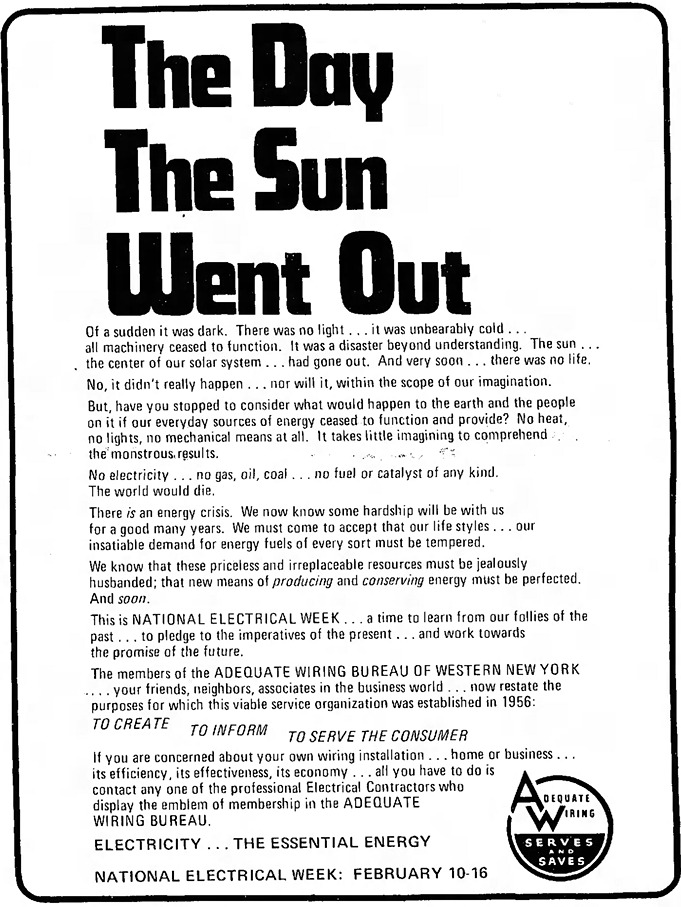
Wellsville Daily Reporter - Feb 13, 1974
Posted By: Alex - Sat Sep 28, 2019 -
Comments (1)
Category: Languages, Odd Names, Public Utilities, Power Generation
Spanish for the California farmer
First published in 1981. It included translations for phrases a farmer might need to communicate with his workers, such as, “Clean up your camp. You live like a f**king pig.”One of the authors noted: “This is a practical book. This is not a grammar book. If you want to have beautiful Spanish, you can get your grammar books and go to school. If you want to be practical in a farm case, you have to know the slang. People use the language.”
The book is available on Amazon, though listed as “Out of Print — Limited Availability.”

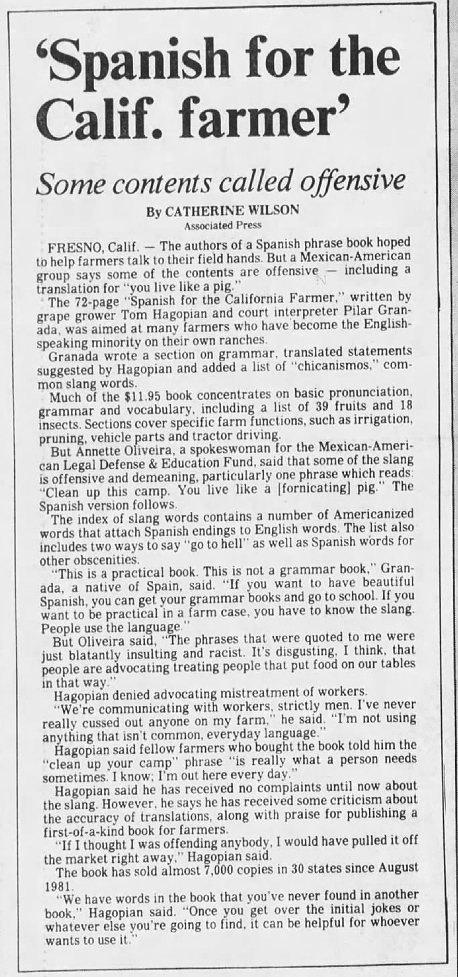
Wilmington Morning News - Jan 9, 1983
Posted By: Alex - Mon Jan 28, 2019 -
Comments (7)
Category: Languages, Books, 1980s
Follies of the Madmen #398
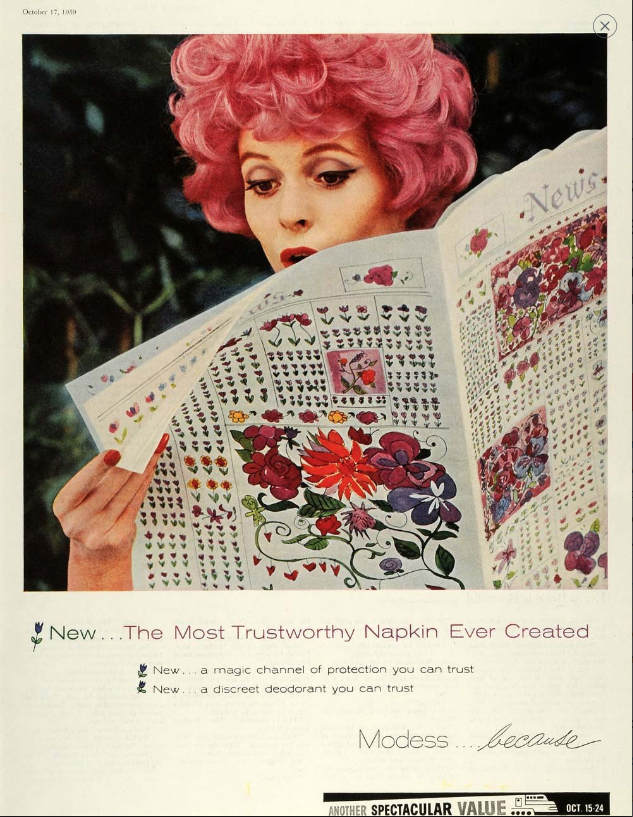
Usage of this product enables user to read the mystical language of flowers.
Original ad here.
Posted By: Paul - Thu Nov 29, 2018 -
Comments (1)
Category: Business, Advertising, Hygiene, Body Fluids, Languages, Nature, 1950s

| Who We Are |
|---|
| Alex Boese Alex is the creator and curator of the Museum of Hoaxes. He's also the author of various weird, non-fiction, science-themed books such as Elephants on Acid and Psychedelic Apes. Paul Di Filippo Paul has been paid to put weird ideas into fictional form for over thirty years, in his career as a noted science fiction writer. He has recently begun blogging on many curious topics with three fellow writers at The Inferior 4+1. Contact Us |



